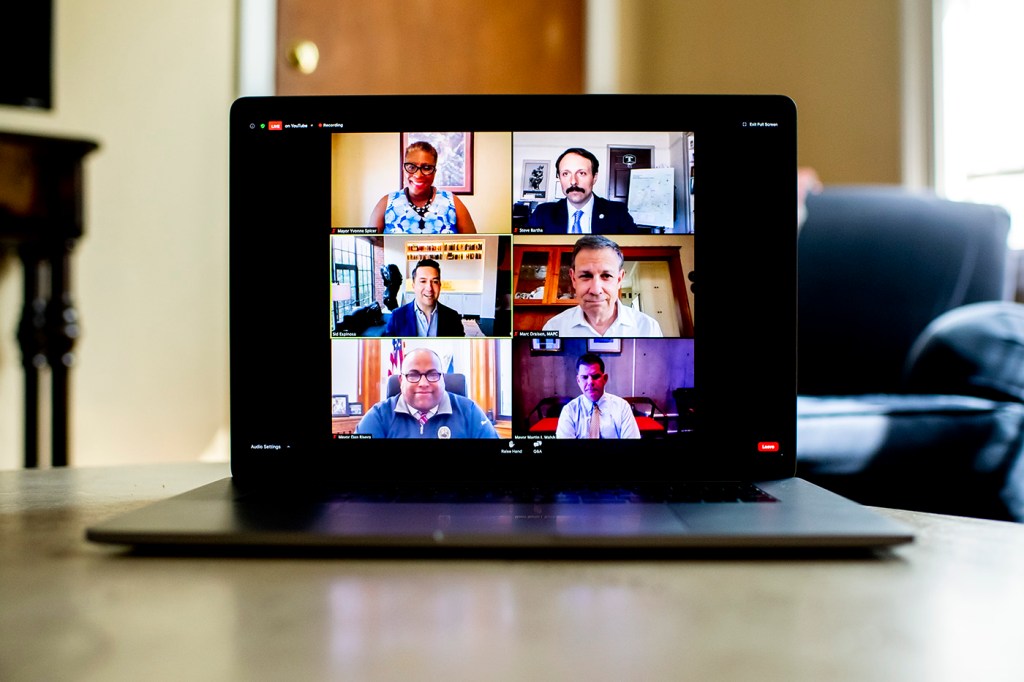Imagine leading a city through a pandemic and mass protests. Now imagine doing it from home.

Imagine running a city during a devastating public health crisis compounded by nationwide racial turmoil. Imagine having the responsibility of holding together an ecosystem where citizens are relying on you for essential services and to come up with solutions to urgent life-and-death problems. Throw in skyrocketing unemployment and an economic downturn for good measure. Now imagine doing that from home.
The scenario was posed by Sid Espinosa, director of philanthropy and civic engagement at Microsoft and the former mayor of Palo Alto, California. But it was lived by three mayors and one town manager in Massachusetts who participated in the final panel of a conference hosted by the Boston Area Research Initiative.
The theme of the discussion, led by Espinosa, was how to rebuild stronger communities after COVID-19, and the turmoil unleashed by the killing of George Floyd in May.
“Building back better doesn’t just happen,” said Daniel O’Brien, associate professor of urban affairs, public policy, criminology and criminal justice at Northeastern, who directs the Boston Area Research Initiative. “Innovation is not value-neutral. It has to be driven by the kind of society we in fact want. This is an opportunity and we shouldn’t miss it.”
Boston Mayor Martin J. Walsh said that there has been a renewed effort in his city to address racial inequities in the wake of Floyd’s death.
“I’m hopeful for the future in Boston, but I’m also cautious about the future in Boston,” Walsh said. “We cannot go back to the old normal. We need to find a new and better normal moving forward.”
Echoing Walsh’s comments, Yvonne Spicer, the mayor of Framingham, Massachusetts, said her city is also reflecting on how to address racial disparities.
“It’s listening, it’s committing to some action, and rectifying institutional racism,” she said. “We have to name it, we have to call it, and we have to fix it.”
Dan Rivera, the mayor of Lawrence, Massachusetts, said that in his community, the COVID-19 crisis, along with the Floyd incident, has shone a flashlight on persistent inequities, the importance of housing and food, as well as the value of the people providing essential commodities and services. And now, as Lawrence begins to reopen, it is being compelled to think creatively about its problems, he said.
“We have some commercial space that’s not going to get refilled, because people are just going to work from home,” he said. “How about we make those spaces housing? That way we can bring the price of rent down and create a better lived environment.”
Steve Bartha, the town manager of Danvers, Massachusetts, said that the conversations in his community tend to be centered around the long-term implications of the crisis for traffic patterns and commuting, commercial spaces and housing development, and high-speed internet for companies offering remote employment.
On the topic of data, Marc Draisen, the executive director of the Metropolitan Area Planning Council, cited the challenge of ensuring that data collected by privately held gig economy companies is made available for policy-making. Data can inform public policy debates, he said, “as long as it’s “democratically available” and open to interpretation and discussion.
“One of the issues we faced early on in COVID-19 with the testing information [in Massachusetts] was there wasn’t enough of it, it wasn’t being gathered in a routine manner, it wasn’t being made available by municipalities, and it wasn’t all being made public,” Draisen said.
As Boston looks to gradually reopen, Walsh said it is using data as a primary source to inform those decisions, while Rivera said his city has used data to gauge the needs of underrepresented communities.
The leaders also discussed the importance of collaboration between cities and sharing best practices, especially in the midst of the pandemic. Walsh recounted that when Seattle was the epicenter of the crisis in March, the city’s mayor, Jenny Durkan, called and informed him about the situation at the nursing homes in Seattle.
“If you look in Boston, a lot of our deaths in Massachusetts happened in nursing homes,” he said. “But in the city of Boston—deaths happened there as well—we were able to get in there and provided personal protective equipment to the nursing homes and provided additional staff there.”
On the topic of Boston’s enduring housing crisis, Draisen said that ending segregation should be a top priority. The region has a “desperate need” to have different races and ethnic groups living with and understanding each other, he said.
“And unless we build more housing and find ways to build more housing that is available and affordable to everybody everywhere in the region then a lot of the problems that we’ve seen during COVID-19 and a lot of the problems that we’ve seen in regards to the relationships between law enforcement and the communities of color, those are problems that we’re going to continue to see because we are not living with each other,” Draisen said.
Nearly 600 viewers tuned in to the virtual conference. Over the span of 15 weeks, roughly 70 speakers discussed not only how to rebuild after COVID-19 and the importance of addressing persistent and pervasive racial and economic inequities, but also the challenges of transportation, housing, education, pollution, and the climate.
O’Brien said that the Boston Area Research Initiative has been developing a database that is drawing from various sources, including administrative records and social media feeds, to track the pandemic from the beginning to its eventual end.
“That’s going to be a really valuable public resource for research and teaching that we hope can drive a lot of work in the next year,” O’Brien said.
For media inquiries, please contact media@northeastern.edu.





